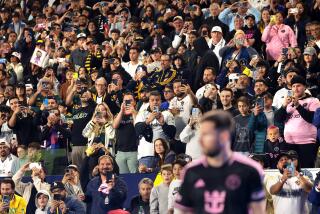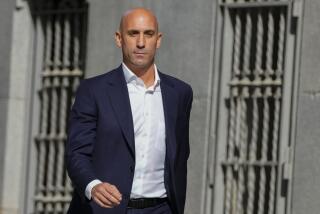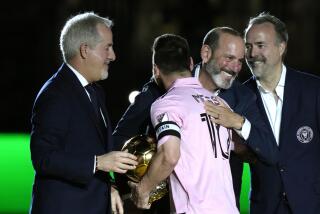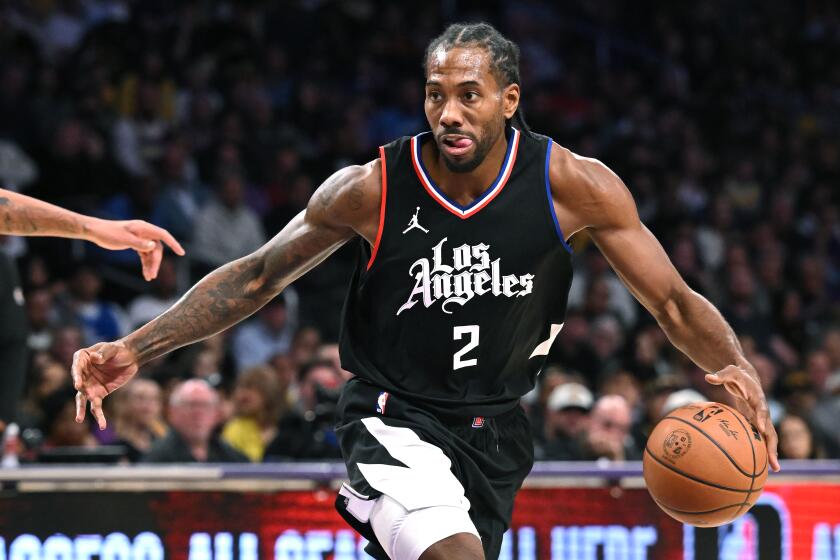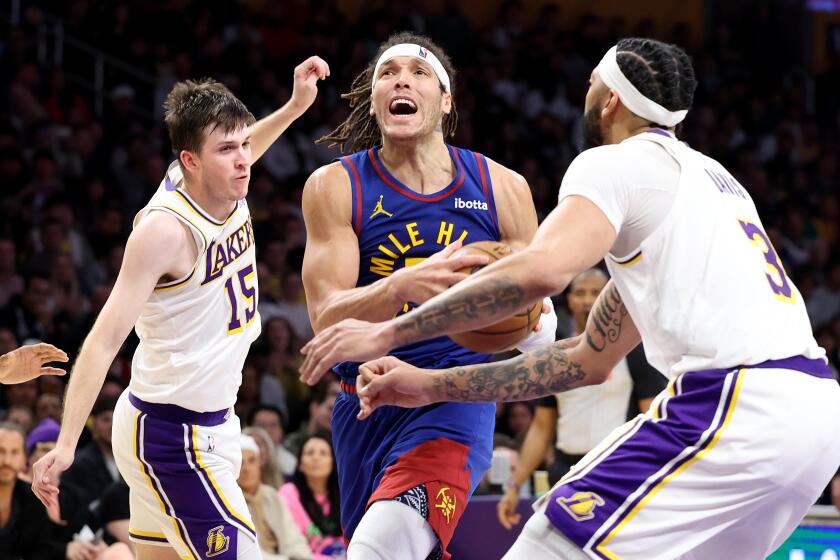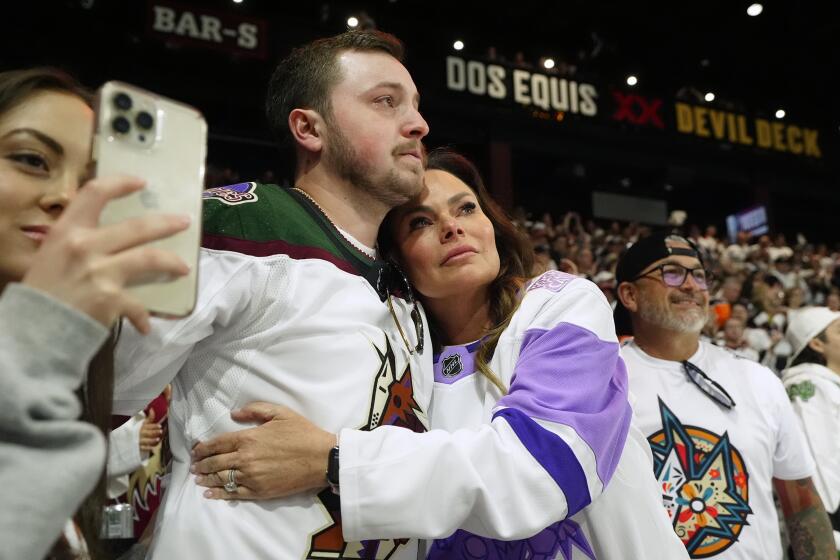‘World Cup of fraud’ rocks FIFA, soccer’s top body
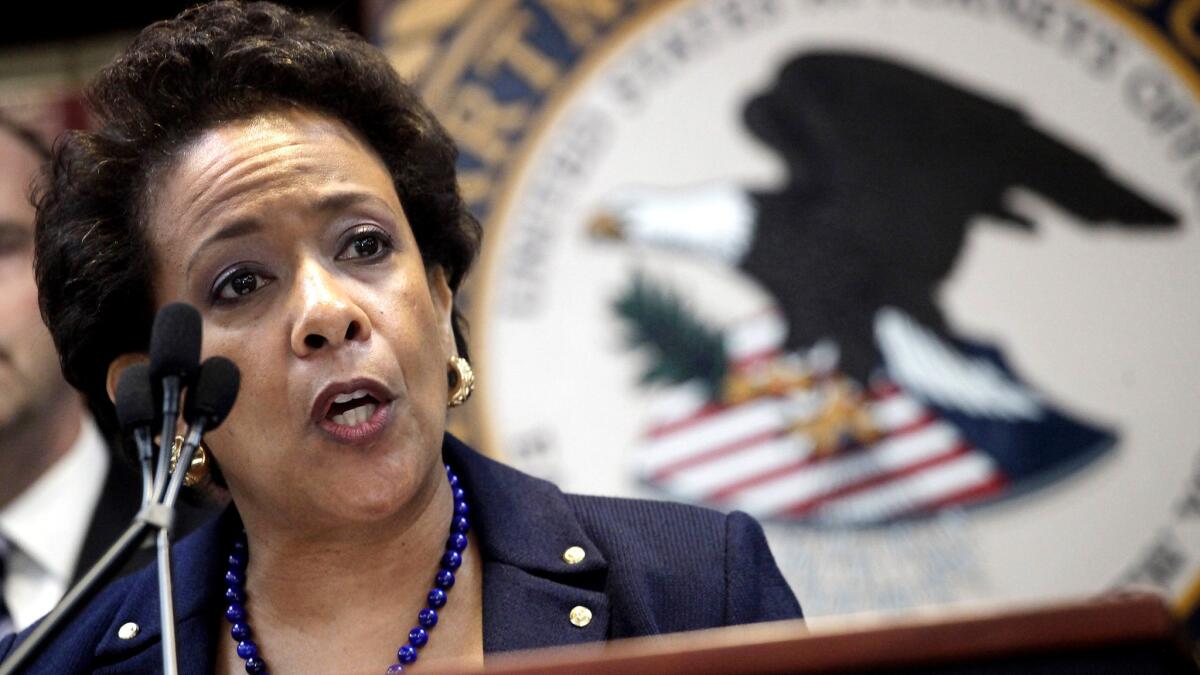
U.S. Attorney General
After a day of police raids and high-profile arrests that staggered the world of soccer, prosecutors in the U.S. and Switzerland said their probe into corruption at the sport’s highest levels had only begun.
Trouble for what is often called “the beautiful game” began early Wednesday when U.S. Atty. Gen. Loretta Lynch announced that a lengthy investigation into the business dealings of FIFA — soccer’s governing body — had uncovered decades of bribery totaling more than $150 million.
Federal racketeering charges were unveiled against 14 people, including nine current and former FIFA executives, seven of whom were arrested at a luxury hotel near the organization’s headquarters in Zurich, Switzerland.
None of the alleged schemes involved fixing games. Instead, officials were charged with buying and selling votes to deliver the 2010 World Cup to South Africa and soliciting kickbacks from sports marketers who sought to be affiliated with major competitions.
FIFA executives “corrupted the business of worldwide soccer to serve their interests and to enrich themselves,” Lynch said. “They did this over and over, year after year, tournament after tournament.”
As part of a separate criminal proceeding — focused on bidding for the 2018 and 2022 World Cups — Swiss authorities seized electronic data and documents from FIFA offices.
The joint investigations put additional heat on FIFA President Sepp Blatter, who has weathered years of accusations but has never been charged or sanctioned. He was not named in either the American or Swiss cases.
“As unfortunate as these events are, it should be clear that we welcome the actions and investigations of the U.S. and Swiss authorities,” Blatter said in a statement, adding that “such misconduct has no place in football and we will ensure that those who engage in it are put out of the game.”
The longtime chief of soccer is seeking a fifth term in an election scheduled for Friday. FIFA has refused to delay the vote despite growing cynicism about its leadership.
“It’s always been this dark cloud that continually follows around the sport,” said Eric Wynalda, a former U.S. national team player and current analyst for Fox Sports. “This is the tip of the iceberg.”
The 47-count indictment covers a wide range of FIFA affairs.
Bribe money was allegedly transferred to a contractor building a swimming pool at executive Jeffrey Webb’s home in Georgia. In another instance, prosecutors allege that the South African government paid $10 million to get the 2010 World Cup; that money was shifted from Switzerland to a New York account, and more than $1 million was diverted for the personal use of former official Jack Warner.
In 2011, Warner allegedly handed out envelopes — each stuffed with $40,000 cash — on behalf of a candidate running for the FIFA presidency. The indictment states that he grew angry upon hearing that a recipient had talked about the payouts.
“There are some people here who think they are more pious than thou,” he allegedly said. “If you’re pious, open a church, friends. Our business is our business.”
Webb and Warner are key figures in the case because of their prominence in the sport.
Webb serves as one of Blatter’s vice presidents and is head of CONCACAF, a continental confederation that manages soccer in North America, Central America and the Caribbean under the FIFA umbrella.
Warner retired as CONCACAF president and FIFA vice president in 2011 amid allegations of corruption.
Seven other soccer executives from Central and South America and the Caribbean were also named, as were five sports marketers. Of the seven FIFA officials arrested by Swiss police — who acted on the request of American prosecutors — all but one reportedly will fight extradition.
“If this comes as a surprise to anyone, they haven’t been paying attention to FIFA,” said Richard Sheehan, a finance professor at Notre Dame who studies international soccer. “This organization is and has been corrupt to the core.”
Though much of the alleged wrongdoing involved people and events in other countries, it wasn’t entirely surprising that U.S. prosecutors got involved.
By way of what the indictment referred to as “sophisticated money laundering techniques,” kickbacks passed through U.S. banks and $110 million in alleged bribes involved the 2016 Copa America, a tournament coming to America for the first time. On Wednesday, FBI and IRS agents raided CONCACAF offices in Miami, removing computers and boxes of materials.
The case has been bolstered by Charles Blazer, a veteran FIFA official in America who agreed to cooperate. Blazer, three other men and two corporations have pleaded guilty to crimes involving bribes of more than $100 million.
“People will say it should have been the British or the French or the Spaniards who brought these charges,” said William Birdthistle, a law professor at IIT Chicago-Kent College of Law. “America is the only country that has the clout do this but doesn’t care about retribution from FIFA.”
Birdthistle and others consider soccer particularly vulnerable to corruption because it generates billions of dollars worldwide and involves small, poor nations where officials might accept cash under the table.
In addition, major tournaments generate the kind of money that would tempt sports marketers to pay kickbacks for media and marketing rights they can turn around and sell to broadcasters and corporate sponsors.
Swiss authorities have focused on the highly public and controversial FIFA votes that awarded World Cups to Russia in 2018 and Qatar in 2022.
Qatar was considered particularly unusual because its intense heat would force the summertime event to shift to a fall date. Several of the indicted defendants belong to the FIFA executive committee that is crucial to selecting host cities.
Even as Swiss police said they plan to question 10 executive committee members, FIFA declined to hold a re-vote on 2018 or 2022.
In the U.S., Lynch said: “I think FIFA has a lot of soul-searching to do.”
American officials have hinted at future developments in their case.
“This really is the World Cup of fraud,” said Chief Richard Weber of the IRS-Criminal Investigation. “This investigation is not over.”
Twitter: @LATimesWharton
More to Read
Get our high school sports newsletter
Prep Rally is devoted to the SoCal high school sports experience, bringing you scores, stories and a behind-the-scenes look at what makes prep sports so popular.
You may occasionally receive promotional content from the Los Angeles Times.

